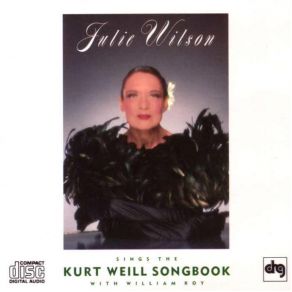Sings the Kurt Weill Songbook
Download links and information about Sings the Kurt Weill Songbook by Julie Wilson. This album was released in 1988 and it belongs to Jazz, Vocal Jazz genres. It contains 14 tracks with total duration of 56:41 minutes.

|
|
|---|---|
| Artist: | Julie Wilson |
| Release date: | 1988 |
| Genre: | Jazz, Vocal Jazz |
| Tracks: | 14 |
| Duration: | 56:41 |
| Buy it NOW at: | |
| Buy on iTunes $9.99 | |
Tracks
[Edit]| No. | Title | Length |
|---|---|---|
| 1. | One Touch of Venus | 2:52 |
| 2. | That's Him | 3:59 |
| 3. | September Song | 2:47 |
| 4. | There's Nowhere to Go But Up | 3:33 |
| 5. | Medley: Foolish Heart / This Is New / Speak Low | 4:44 |
| 6. | The Bilbao Song | 5:39 |
| 7. | Medley: What Good Would the Moon Be? / Here I'll Stay | 4:31 |
| 8. | Sing Me Not a Ballad | 2:37 |
| 9. | Surabaya Johnny | 4:44 |
| 10. | Barbara Song | 3:36 |
| 11. | My Ship | 2:51 |
| 12. | The Saga of Jenny | 4:34 |
| 13. | Trouble Man / Stay Well | 4:45 |
| 14. | Mack the Knife | 5:29 |
Details
[Edit]The day after Julie Wilson recorded her Stephen Sondheim songbook album for DRG Records, she went back into the recording studio and recorded her Kurt Weill songbook album. That may seem like rushing things, but when you're 63 years old and you get your first recording contract in 26 years, why wait? Certainly, Wilson is at least as familiar with Weill's repertoire as she is with Sondheim's, and certainly Weill (with his lyric collaborators) wrote as many songs well suited to her world-weary, seen-it-all nightclub persona as Sondheim has. From her choices, Wilson clearly is more comfortable with the Broadway Weill than the Berlin Weill, particularly with two of his shows of the '40s, Lady in the Dark (lyrics by Ira Gershwin) and One Touch of Venus (lyrics by Ogden Nash). Of the 18 songs in 14 tracks on the disc (three tracks are medleys of two or three songs), seven come from those two shows, among them standards like "Speak Low," "That's Him," and "The Saga of Jenny," but also relative obscurities such as "Foolish Heart" and "This Is New." (It is surprising that Wilson passes over another One Touch of Venus evergreen, "I'm a Stranger Here Myself.") Elsewhere, she plucks lesser-known songs from lesser-known Broadway shows like Street Scene, Love Life, and The Firebrand of Florence, giving a sense of Weill as largely a ballad-writing romantic. But she also delves into those songs about age and experience, presenting a female-oriented version of "September Song" from Knickerbocker Holiday, and the bitter torch song "Surabaya Johnny" from Happy End. The latter is one of the relatively few songs Weill wrote early in his career in Berlin with Bertolt Brecht that Wilson takes on; there are only four such tunes here. (Another surprising omission is "Pirate Jenny.") As ever, Wilson renders the lyrics knowingly in her half-spoken singing voice, while William Roy provides simple, lively piano accompaniment and occasionally jumps in to sing with her. She succeeds at presenting Weill in the guise of a nightclub sophisticate, but only by making a narrow selection of his catalog.